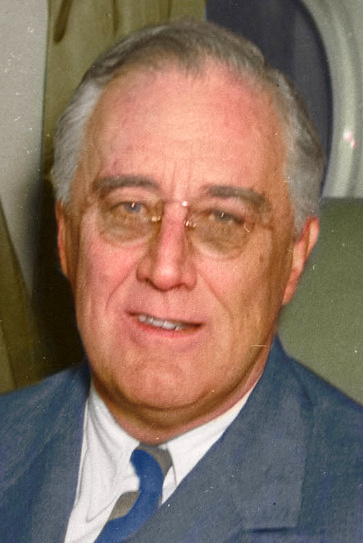The Pittsburgh Press (December 29, 1943)

Fourth term hint is given by President
His disavowal of ‘New Deal’ regarded as start of campaign
By Lyle C. Wilson, United Press staff writer
Roosevelt ordered to rest by doctor
Washington (UP) –
The White House announced today that President Roosevelt is suffering from a head cold and will remain in his presidential quarters today.His physician, RAdm. Ross T. McIntire, said the President has no fever, but he thought it best for him to stay away from his offices.
Washington (UP) –
President Roosevelt’s disavowal of the term “New Deal” as the administration’s reform trademark was widely regarded here today as the first important move toward a win-the-war fourth term campaign.
But others regarded his triumphant accounting of administration policies since 1933 as a reply to those critics who have accused Mr. Roosevelt of having lost interest in the reform era now that a war was underway.
The President tossed the term “New Deal” overboard in a casual conversation last week. He made it official at yesterday’s news conference during which he read a partially prepared statement to nearly 200 reporters who somehow felt they were participating in an historic occasion.
Fourth term drive?
He said the patient – the United States – is not wholly well yet and won’t be until the war is won.
He was asked:
Does all this add up to a fourth term?
The President replied:
Oh now – we are not talking about things like that now. You’re getting picayune. I know you won’t mind my saying that, but I have to say something like that.
His rejoinder recalled a similar set of circumstances three years ago when he was asked whether he would seek a third term. On that occasion he advised the inquiring reporter to go in a corner and put on a dunce cap.
Raises questions
Whatever the motive, the abandonment of the term “New Deal” after ten years of what has come to be called the New Deal-Democratic coalition raises some political questions. The coalition began to sag in the 1942 general elections and buckled badly in scattered contests this year.
Some of Mr. Roosevelt’s left-wing supporters have been intimating that he was running out on New Deal philosophers as well as terms. Some of his conservative party partners have been warning of political disaster unless Democrats dissociate themselves from the New Deal at once.
Senator Edwin C. Johnson (D-CO) said on Dec. 6:
The New Deal is through. If the Democratic Party persists in hanging on to its dead corpse, it will lose the Senate, the House and the governors of every Northern and Western state in the next election.
Guffey’s dispute
Southern politicians have been muttering for months. Their displeasure burst like shrapnel in the Senate this month against Senator Joseph F. Guffey (D-PA) who had offended them in his role of New Deal spokesman. It is significant that the Southern bitterness is against the “New Dealers” rather than against the administration as a whole or against the President himself.
New Dealer No. 1 in this town is Harry L. Hopkins, Mr. Roosevelt’s personal aide and confidante. There was speculation here today whether the President might be preparing to get him out of the country in the presidential campaign year. There would be precedent for that.
When Herbert C. Hoover was nearing the test of his second presidential campaign, he summarily removed from his Cabinet and sent to London as ambassador an old man who had been the prophet of prosperity until the Depression came and then had come to be regarded as a crippling political liability.
The old man was Andrew W. Mellon, Secretary of the Treasury. Mr. Mellon did not want to go. But he went.
Left-wing supporters of the administration began to be apprehensive after Mr. Roosevelt, refereeing a bout between Vice President Henry A. Wallace and Secretary of Commerce Jesse H. Jones, declared Mr. Jones the winner and stripped Mr. Wallace of all participation in the war effort. It was a rebuke rarely equaled.
The New Republic’s Washington columnist on Aug. 23 wrote:
The New Dealers who are not trying to apologize for the President are asking themselves whether Mr. Roosevelt again will become the champion of progressive government once the war is won.
New leadership
The Nation, liberal weekly, said on July 24 after the Jones-Wallace row:
The man who created the New Deal seems intent on destroying it before he leaves office in his flaccid retreat before the Bourbons of his own party. Isn’t it about time for labor and the left to look around for new leadership?
Similarly suspicious, the eighth annual convention of the CIO United Auto Workers on Oct. 7 voted to support a Roosevelt fourth term only on the condition that he took “an aggressive position against the foes of the New Deal.”
